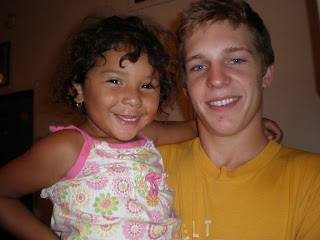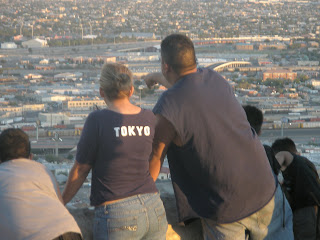In my experience here the most common response to, “Como estas? How are you?” is “Bien, gracias a Dios! Good, thanks to God!”
Commonly, when I say, “Hasta mañana. See you in the morning.” I hear the response, “Si Dios quiere. If God wants.”
God is thanked and acknowledged frequently. Unlike the communities that I have grown up in, God is very much a part of everyday life. As an organization, we hold masses, and say thanks to God before every meal. This culture of religion is so new to me, and I have spent much time contemplating its role, practicality, and relevance to me.
Religion has been woven into the fabric of my El Paso life, and it has come to my attention that whether or not I have faith in a God, religion does exist and it is indeed a major player in the dynamics of society, and therefore, it is my interest to come to terms with it, and define the role it will take in my life.
I remember, the moments on childhood Sundays, dressed in khakis and a collar, sitting on a bench, when I became too bored, too lost in the events, to continue. I would tap a sister to my side and we would sneak out to the magnolia tree behind the church. Swinging, climbing, and running we enjoyed, as we waited until the service was over and the people shuffled out two by two.
Before meals we would sometimes say, “Thank you God for the food we eat, thank you God for the birds that sing, thank you God for everything!”
Those were the relatively subtle manifestations of religion in my childhood.
As I aged, I slowly acquired a knee-jerk reaction to the word God. I certainly felt a distance from religion, and it seemed to me an incredible force that pulled people from reality, and into a world where energy was boundless. Where people could be captivated and directed so quickly and forcefully, either for the good or for the bad. The intensity of captivated energy and passion frightened me. The reaction that one might have when they hear the term “cult” was similar to the reaction that I had when I heard the word God. Words that came to mind were fear, control, power, violence, and even oppression.
Arguably, these words have been a part of religion in history. And it was these parts, and only these parts, that I cared to recognize. Growing up in mainly white and mainly wealthy communities nurtured my ability to see past the simultaneous beauty and relevance of religion.
It was a change of settings that allowed me to see a different side of religion for the first time. I was in Camoapa, a small agricultural town in Nicaragua, when I asked the director of the organization that I was working with about the reasons for its Catholic affiliation. The organization was a center where kids from the community could come for meals, showers, activities, and help with schoolwork. The director explained to me that some of the kids have no parents, no family, and no home. And that God, and the belief that some greater force is looking out for you, is the last option to keep hope in the lives of these children.
This explanation really resonated with me. It illuminated a good purpose for religion that I hadn’t experienced at home. I was able to recognize that at a level, religion can be the sustenance for those who can’t find other sustenance, and the hope for those that cannot find other hope. With this, I felt very appreciative for the religious structures of the world, but simultaneously still felt no desire to take part in those structures.
Despite the realization, my distrust and fear of religion continued as I once again became isolated from its practical purposes. I was unable to put the word God into terms for myself, so that upon hearing it, it could mean something real to me, and not just immediately turn me away from wherever I heard it.
In deciding to come to Annunciation House, I was forced to consider religion. The organization’s religious roots dig deep. Five young people who were seeking to live out the Gospel and serve the poorest of the poor founded the organization. Believe it or not, it was the visiting Mother Teresa who suggested the name Annunciation House to our current director. Biblically, Annunciation was the revelation of Mary that she would conceive Jesus. In all honesty, the connection of that moment to the work of our house, I have yet to fully understand. I have been meaning to ask Teresa.
At home, living in a community of friends and family who in general, have a critical eye on religion, I received many questions regarding religion and the place I would be living. My response generally went something like this, “Well, I think a lot of the religious activities at the house are in place to make it feel more like home to the guests, of which the majority come from Catholic backgrounds. Also, from what I understand it is good religion, about peace and love, and not killing your neighbor.” Now I chuckle as I remember that I was attempting to define ‘good’ religion in my justification for heading south to the border.
As I was waiting in Boston Logan airport (for seven hours) to board my Texas bound plane, I explained to an El Paso native where I was heading and the work that I would be doing. He said to me beneath his clean cowboy hat and gray splattered beard, “you’re doing the Lord’s work.” I smiled, said “Yes,” and gave a stiff nod. To myself I though, “I am doing the work of the people!” This foreboded the role that the notion of God would play in my El Paso life.
Religion came into my world very quickly in many different ways. I experienced masses that the organization held. I noticed God’s name used in colloquial language. I witnessed people’s lives that were dedicating to following God. Two weeks after my arrival, three Somalian guests invited me to church with them. I decided to go. In four hours of service, I saw people get shoved to the floor. I saw screaming, dancing, crying. I saw our guests pull the only money in their possession out of their pockets, and put it into a velvet bag for the church. I was told to scream hallelujah three hundred times while rolling on the floor, running, and dancing. This was just yet another face of religion to which I was exposed.
Experiencing religion on so many scales, with so many different facets, beliefs, and practices makes the word religion seem diluted in its definition. Religion now seems like such an overarching word that ironically almost means nothing; and yet it is what I am writing specifically about.
Religion, in its nature of belief in a relatively intangible force, does create the space for immense amounts of passion, dedication, energy, and faith. It creates the space by opening a fourth dimension where everything is possible and where realities can be created from one’s own faith. The garnering of the products from this fourth dimension—passion, dedication, energy, and faith—can be used to create such goodness, but equally can be used to create such evil. It is religion’s ability to gather force that makes me nervous, because I do not know where that force will go, what it will do.
One question that I have continually wondered since my arrival in El Paso is how would the religiously active change their lifestyles if one day they found out that in fact there was no God? I see people doing such good work. Dedicating their lives to the poorest of the poor. And when asked what keeps them going, they can point to the book, or point to the sky. But it seems so dangerous to me, that someone’s life could be dedicated to the sky, to the book. What would change if God were pulled out of the picture? Would their actions change?
To be honest I think their actions wouldn’t change. I think that, whether acknowledged or not, personal conviction and the strength of the heart is enough for someone to dedicate their life. I notice that credit is often given to God, but not given to the hands and the hearts and the minds of the people on the ground, doing their thing.
Left over from my years of knee-jerk reactions to the word God, I still struggle getting past that reaction, getting past the disconnection that the word God brings to me. Many times I have been reading or listening to something so beautiful and powerful, and then the end of it reveals that it is based on God and the belief in God. In this, I then become isolated from the expressions. Because if it is based on an idea with which I don’t believe, how can it be relevant to me?
Similarly, many of the people involved with Annuncation House say that God is what carries them through the hard parts of the job and that it is God that keeps them dedicated. Hearing that, I wonder, without a belief in God, how can I get through the hard parts? How can I remain personally dedicated?
Finding my ability to do this without a belief in a God brings me back to a ninth grade World Cultures project to design our own religion. Mine was called Induism, derived from the word individual. It was based on the belief in each person’s infinite dignity, love, and goodness. And simply a belief in the inherent goodness of all things. It is the belief and the hope in goodness that is my motivation…the thing that keeps me going.
The big question to me is how to connect the hope in inherent goodness that keeps me going to the hope in God that keeps so many other people going. This is the biggest struggle and the biggest opportunity in my exploration of religion.
A friend asked me if I had attempted to define God on my terms. I began to think that if I could find a way to make the term God practical to my beliefs, then religion would no longer isolate me, but instead include me.
What if the word God could mean to me the inherent goodness of all? If someone were to say, “God bless you!” It would mean to me, “may the inherent goodness of all bless you.” That to me, does not bring up the uneasiness I have with religion, but instead is something relevant and powerful to my world and my beliefs. With this, God, is on practical terms for the life that I feel comfortable living, and can exist without causing isolation. It is finally a personal peace with the existence of religion in this world.
 Above, a fellow volunteer does some toe nail work on one of the guests in the office. We call this guest welfare. What is she actually working on? Look below for a close up.
Above, a fellow volunteer does some toe nail work on one of the guests in the office. We call this guest welfare. What is she actually working on? Look below for a close up. Based on the smile, it seems that things are going well for the toe nail.
Based on the smile, it seems that things are going well for the toe nail.






















